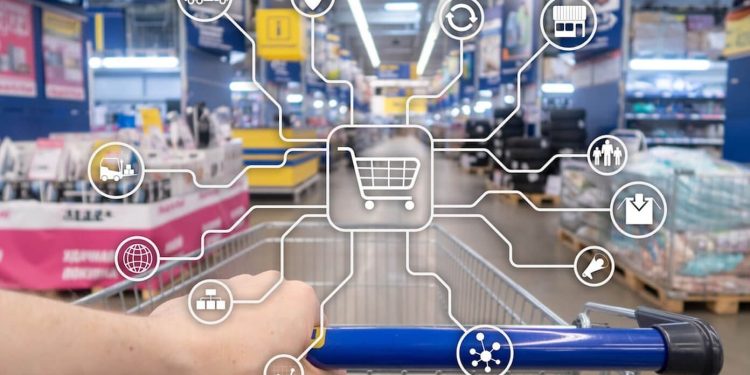The retail industry is being transformed by artificial intelligence (AI). Retailers can use AI to interact with their consumers and run more effectively, from utilizing modern technology to tailor campaigns to employing ML for managing inventory.
In order to survive today’s competition, merchants must handle customers in ways never seen before while also reducing defects and waste in their processes. One can obtain the data, but a proper understanding of it all needs some considerable brain.
But, how is AI changing the retail industry? For retailers, this means exceptional customer service, revenue growth potential, technology growth, and smart processes which enable you to stand out from the competition.
Retailers who want to stay ahead of the competition should delve into artificial intelligence in the retail industry. Here’s how Artificial Intelligence is affecting the retail industry. Also, explore the applications of the same.
What Is the Need for AI In the Retail Sector?
There are several advantages of AI in the retail industry, so here are some major ones that merchants can bank on.
- With a slew of creative rivals offering engaging shopping experiences, conventional retailers must improve the customer experience in a customized, appropriate, and exciting manner throughout all touchpoints.
- Retailers must differentiate their items and provide consumers with appealing services and experiences in order to maintain their attention. Retailers may lead with creativity rather than respond to uncertainty by incorporating predictive modeling to acquire more market knowledge.
- Retailers will have to go through the headache of decluttering all the data from multiple sources into strategies that ultimately benefit the company. Dealing with such data and analyzing it properly can be a challenge for the retailers. This is where Artificial Intelligence comes in.
- While physical and digital commerce channels often follow different agendas and methods, considering them as separate business units creates complexity for customers looking for a smooth shopping experience and difficulties for retailers.
- To meet a wider variety of customer needs that are transitioning from general to niche, usually creates a lot of issues. Merchants must rethink their old supply chains in lieu of adaptable and flexible networks that can swiftly adjust to changing consumer behaviors.
Also read: What is Trending in The Retail Industry in 2022?
The Role of AI in Enhancing the Functioning of the Retail Industry
Beyond business insights and nimbleness that all these technologies may bring, the digital revolution in the retailing sector is definitely worth understanding. Technologies like AI-powered video analytics in CCTV cameras can detect and collect data of activities taking place in the business.
Traffic Analysis and Occupancy Monitoring
Multiple consumers enter and exit a regular retail outlet on a regular basis. As AI has statistics of the outlet’s occupancy at any point in time, it can aid in accurately analyzing this statistic. Furthermore, they may help businesses monitor their outlets daily or hourly and increase foot traffic.
Heatmap Analysis
Retailers may utilize AI-enabled video analytics to figure out which parts of the store seem to be the most attractive. This will enable the organization to assess which items are gaining the greatest momentum and aid in data-driven decision-making.
Check On Staffs
CCTV cameras paired with AI can monitor staff effectiveness throughout the store. It also assists stores in estimating the requirement of employees depending on the volume of footfall. As a result, retailers can leverage their human capital or repurpose their staff, resulting in increased cost-effectiveness.
Customer Queue Management
During peak periods, like the festive season, stores are generally overcrowded, resulting in queues at the cash register. Stores may use AI technology to track the crowd in counter lines and estimate the waiting period for each customer, making counter management easier.
Demographics Study
AI-powered cameras can determine the age brackets of visitors to establishments, resulting in more efficient inventory management and administration and smart marketing. These cams can also track repeating customers using facial recognition, helping businesses to increase customer satisfaction and retention.
AI Applications in Retail
The year is 2022, and AI applications do have a lot of opportunities to expand. Nevertheless, several real-world AI solutions have shown business value.
Cashier-free Stores
Cashiers may be eliminated from stores. Store automation will lead to shorter queues, fewer human personnel, and huge savings on operating costs. Amazon is one such giant that has already used AI for cashier-free stores.
In-store Help
Retailers also invest in technology that assists customers throughout the shopping experience as well as store employees. Newly introduced technologies have replaced paper price labels with intelligent shelf tags in their shops. This innovation also presents video commercials, nutritional information, and promotions on the monitors.
Chatbot Assistance
AI chatbots offer even better customer service, optimize search, deliver updates about new releases, and recommend related goods. Eighty percent of companies across the globe are now utilizing or will be employing AI chatbots. Burberry and Tommy Hilfiger have also created chatbots to assist shoppers in navigating their collections.
Price Alteration
Applications of AI in retail establishments might assist firms in valuing their items by showing the expected effects of various pricing schemes. To do so, systems gather data about other items, promotional efforts, sales numbers, and other information. Corporate leaders can deliver the greatest deals, resulting in more clients and increased revenue.
Final thoughts
Retailers must be flexible in order to keep up with shifting trends. To achieve so, firms should swiftly measure and enhance their operations. The retail business is rapidly evolving, and the integration of AI will accelerate expansion even further. AI is laying the groundwork for developments and is clearly the path for this industry, owing to the multiple benefits it delivers.
These systems can potentially operate independently, utilizing powerful AI analytical skills to transform raw data acquired from sources into meaningful insights. AI in retail also makes use of behavioral analytics and consumer intelligence. This can help in getting important information about various demographics and enhance a variety of interactions in the field of customer service of a company.








